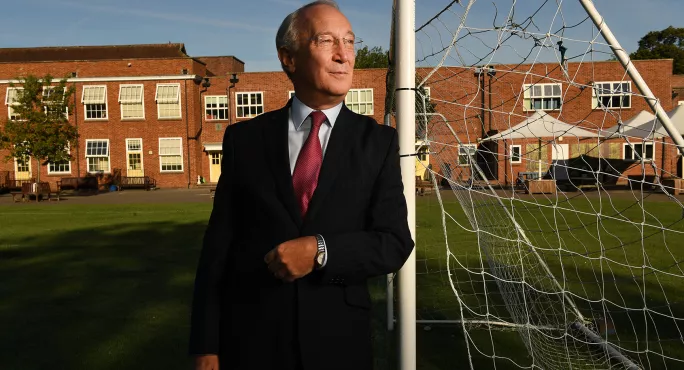We need a teacher ‘propaganda parade’, says Carter

The schools sector should go on a “propaganda parade” to “raise the status” of teaching, and take care not to “wash all our linen in public”, to help recruitment, a former government adviser has said.
Speaking at a conference on teacher training, Sir Andrew Carter, CEO of South Farnham Educational Trust and author of the 2015 review of initial teacher training (ITT), acknowledged today that there are “real problems” with “teachers working against enormous odds”.
However, he urged those working in teaching to tell everybody “it’s a great job” to ensure that people want to join the profession.
And, speaking in a webinar on the future of ITT hosted by the Westminster Education Forum (WEF) today, Sir Andrew said that if, in hindsight, he could have done anything differently on the Carter review, it would have been putting more focus on getting “every school involved” in teacher training.
At the same event, Emma Hollis, CEO of the National Association of School-Based Teacher Trainers (NASBTT), warned that the teaching apprenticeship system is “bureaucracy at its worst” and a “lot of red tape” will have to be removed for the new teacher degree apprenticeship (TDA) to have an impact.
Teacher recruitment trouble
Since the Carter review in 2015, the teacher supply crisis has only worsened, with the government missing its recruitment target for secondary teacher trainees every year (apart from 2020-2021, when the disruption of the pandemic fuelled interest in the profession).
And a recent report by the National Foundation for Educational Research (NFER) warned that the government is “at risk of under-recruiting” secondary trainee teachers for 10 out of 17 subjects for next year, despite a rise in bursaries and increase in international applications.
- Sir Andrew Carter: Why MATs should bridge the primary-secondary divide
- Teacher degree apprenticeship: Everything you need to know
- School funding: Three in 10 parents say school cuts are hitting children’s education
Speaking in the WEF webinar today, Sir Andrew said: “I do think we need to go on a little bit of a propaganda parade to tell everybody it’s a great job. Because the story is now we’re overworked, there’s discipline issues. Please...don’t think there isn’t.
“But what we’ve got to do - and sure there are real problems and there are teachers working against enormous odds - but let’s tell everybody it’s a good job, it’s a great job. Let’s raise its status, so that people do want to become a teacher.”
School leaders have increasingly warned in recent years that schools have become the “fourth emergency service” amid an erosion of support services in wider society.
And the recent NFER report called on the government to set up an independent review focused on how to reduce teachers’ workload related to behaviour management and pastoral care, warning that “little progress” has been made on cutting high teacher workload, with teachers saying that pupil behaviour is “driving higher workload”.
Sir Andrew urged viewers of the webinar to “get on to the television, on to the radios, put up some banners about how great it is, not talk about workload all of the time - but we must talk about workload - but let’s not wash all our linen in public”.
Degree apprenticeship could have ‘little impact’
The government recently announced its plan for a new TDA to launch this autumn, offering an alternative route into teaching for those without a degree.
From the autumn, providers will be able to recruit on to the new TDA, and a standard setting out course details is set to be published this spring, subject to the approval of the Institute for Apprenticeships and Technical Education.
The first apprentices on this route will start in September 2025.
However, Ms Hollis warned in the WEF webinar today that the impact of the route could be hampered by existing “red tape”.
While she said that there is “opportunity” with the apprenticeship, she warned: “It is bureaucracy at its absolute worst.
“It is almost impossible to navigate your way through the apprenticeship policy and the apprenticeship bureaucracy, and until they simplify that significantly, it is too expensive for providers to run effectively, it’s too expensive for schools to engage with from an employment point of view,” Ms Hollis warned.
She added: “There is so much potential there, but it is bound up in so much red tape and is so expensive to run... I would love to say it could make a big difference, but all of that’s got to be cut through and simplified.
“Otherwise I think it’s going to have very little impact at all. There will be people who try and run it because it’s the right thing to do. But the numbers will be will be very small, I think.”
The NAHT school leaders’ union recently claimed that the scheme could “pose risks to the quality of teaching provision” and “undermine” the profession.
For the latest education news and analysis delivered directly to your inbox every weekday morning, sign up to the Tes Daily newsletter
Register with Tes and you can read two free articles every month plus you'll have access to our range of award-winning newsletters.
topics in this article



